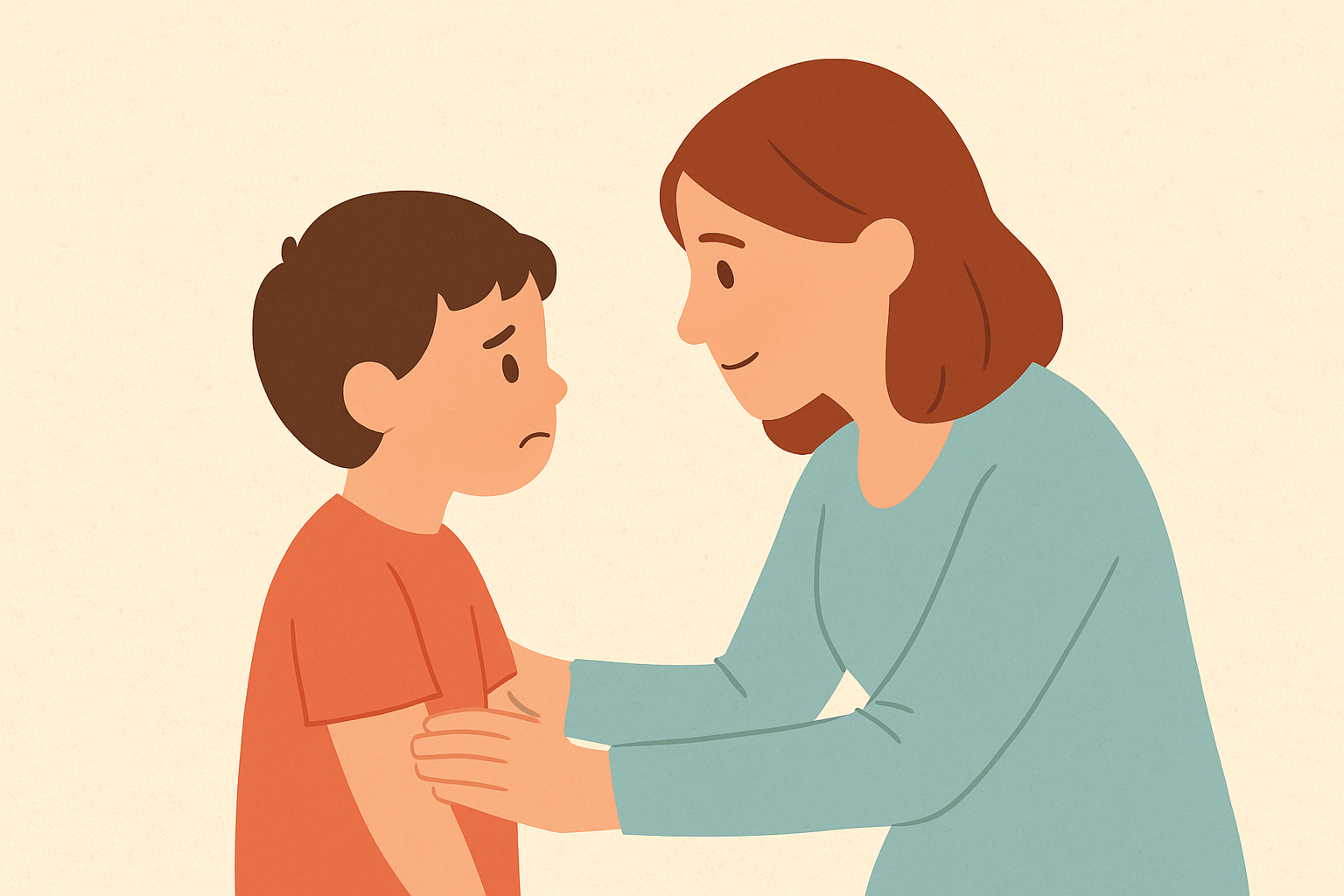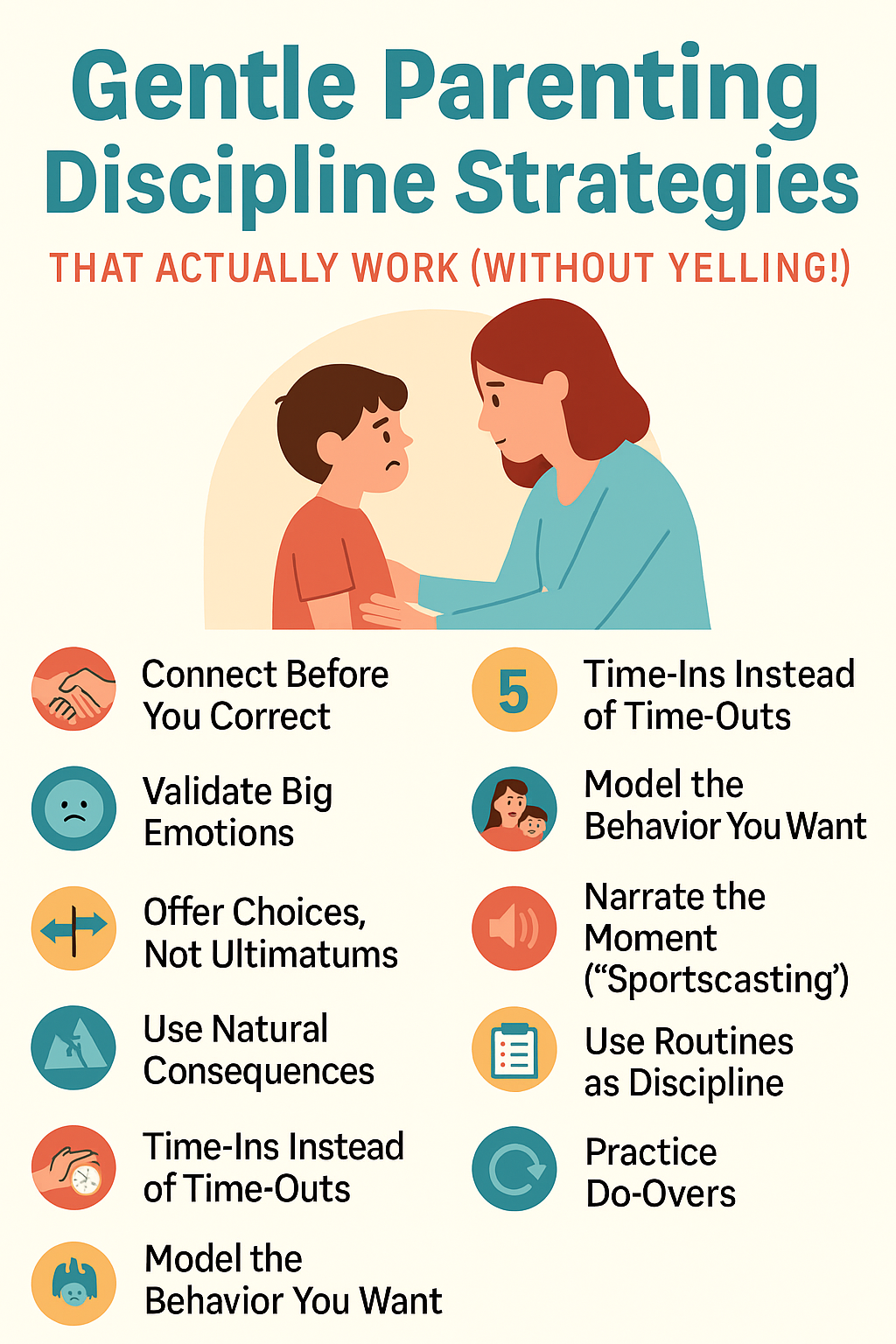Gentle Parenting Discipline Strategies That Actually Work (Without Yelling!)
Do you ever find yourself yelling out of frustration, only to feel guilty moments later? You’re not alone.
Parenting is deeply emotional and incredibly hard, especially when your child seems to ignore every limit you set. But what if there was a better way to discipline—one that builds connection, teaches life-long skills, and doesn’t rely on punishment?
Gentle parenting discipline strategies are rooted in respect, empathy, and long-term growth. They’re not permissive or passive. Instead, they’re intentional, thoughtful, and incredibly effective.
If you’ve been searching for gentle parenting discipline strategies that work in real life, you’re in the right place.
Let’s explore how to implement these strategies at home—without yelling, threats, or bribes.
Heads up: This post may include affiliate links. As an Amazon Associate, I earn from qualifying purchases—at no extra cost to you. Full privacy policy and disclosure here.

What Is Gentle Parenting?
These gentle parenting discipline strategies create long-term cooperation and trust without relying on threats or time-outs.
Gentle parenting is a respectful, empathetic approach to raising children that emphasizes connection over control. It focuses on modeling behavior, setting clear boundaries, and helping kids understand and regulate their emotions.
This approach isn’t about letting children do whatever they want—it’s about teaching them how to behave through patience, communication, and mutual respect. Research from Aha! Parenting shows that gentle discipline helps kids feel secure, which leads to better long-term behavior.
Gentle parenting is not a lack of discipline; it’s discipline done with kindness and consistency.
Why Traditional Discipline Often Backfires
Let’s explore 10 gentle parenting discipline strategies that help build emotional resilience and mutual respect.
Old-school discipline—like time-outs, yelling, and punishments—may stop a behavior short-term, but it often damages the parent-child relationship. It teaches kids to fear consequences rather than understand their actions.
Neurological studies show that young children’s brains aren’t wired for logic or self-regulation under stress. When we yell, we escalate their emotional response and shut down their ability to learn. Gentle parenting strategies keep the learning center of the brain open by staying calm and connected.
10 Gentle Parenting Discipline Strategies That Work
Here are the gentle parenting discipline strategies that actually help kids learn, grow, and listen—without yelling.
1. Connect Before You Correct
Before addressing misbehavior, get on their level and make eye contact. A gentle touch or a hug goes a long way in helping kids feel seen and safe.
2. Validate Big Emotions
Say things like: “You’re really upset right now. It’s okay to feel mad, but it’s not okay to hit.”
This helps kids feel understood and builds emotional intelligence.
3. Offer Choices, Not Ultimatums
Give two options that you’re okay with. Example: “Do you want to clean up your toys now or after your snack?”
This gives kids a sense of control, which reduces power struggles.
4. Use Natural Consequences
Instead of arbitrary punishment, allow consequences to happen naturally. If they refuse to wear a coat, they’ll feel cold.
5. Time-Ins Instead of Time-Outs
Create a calm-down space where your child can go with you to reset.
Try this: Calm Down Corner Kit with sensory tools to help regulate emotions.
6. Model the Behavior You Want
Children learn by watching. Stay calm, apologize when needed, and show patience.
7. Narrate the Moment (“Sportscasting”)
Describe the situation in a neutral tone: “You were building a tower, and your sister knocked it over. Now you’re upset.”
This reduces tension and builds problem-solving skills.
8. Use Routines as Discipline
Consistent daily routines create predictability, which reduces chaos and misbehavior.
Tip: Use a visual schedule to reinforce routines.
9. Practice Do-Overs
If your child is rude or rough, let them try again. “Can you ask for that with kind words this time?”
10. Teach Problem Solving
Guide them through resolving a conflict. Ask: “What could you do next time instead of hitting?”
Bonus: This Emotions and Feelings Game helps kids practice emotional skills through play.
When used consistently, gentle parenting discipline strategies teach kids how to manage conflict, express emotions, and make better choices.
But What If My Child Still Misbehaves?
Discipline is a long game. No strategy—gentle or not—works 100% of the time. Kids are still learning.
The key is consistency. Gentle parenting works best when your expectations are predictable and your reactions calm.
On tough days, focus on connection over correction. If you’re struggling, the Positive Parenting Solutions course offers in-depth tools to get on the same page with your child and stay calm.
Gentle Parenting by Age
Toddlers (1–3)
- Use redirection
- Keep language simple
- Stick to routines
Preschoolers (4–5)
- Offer clear choices
- Use visuals and timers
School-Aged Kids (6–10)
- Practice collaborative problem solving
- Use empathy + logical consequences
Related post: How to Get Your Toddler to Listen Without Yelling
Free Download: Gentle Discipline Cheatsheet
Need a quick reference? Download the free Gentle Discipline Cheatsheet with phrases, strategies, and calm-down ideas. Print it, stick it on your fridge, and refer to it when things get tough.
FAQ: Gentle Parenting Discipline Strategies
Parents often have questions about how to implement gentle parenting discipline strategies in everyday life—let’s answer the most common ones.
Is gentle parenting effective for strong-willed kids?
Yes—because it addresses the root of defiance: disconnection. Strong-willed kids thrive with empathy and firm, loving boundaries.
What if I mess up and yell?
That’s okay. Repair matters more than perfection. Apologize, reconnect, and move forward.
Can I be gentle and still have rules?
Absolutely. Gentle parenting is about respectful discipline, not permissiveness.
Is gentle parenting backed by science?
Yes. Studies show that emotional attunement and connection promote better behavior and resilience long-term. (Zero to Three)
Do I need special tools to be a gentle parent?
No, but tools like emotion cards and calm-down kits can help!
Final Thoughts
Gentle parenting isn’t about being soft—it’s about being firm and kind at the same time. It takes practice, patience, and yes—plenty of do-overs.
Start small. Focus on one or two new strategies this week. And remember: your calm is the most powerful tool you have.
Remember, gentle parenting discipline strategies are not about perfection but about showing up with patience and intention.
Have a favorite gentle parenting win? Share it in the comments!
More Helpful Reads:

